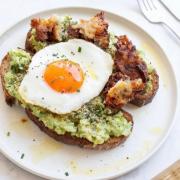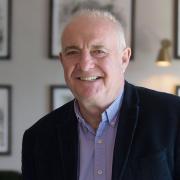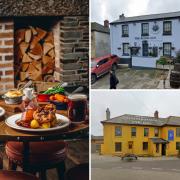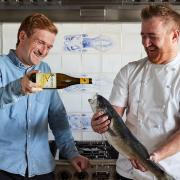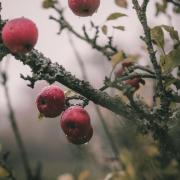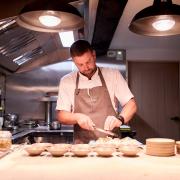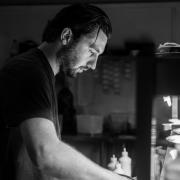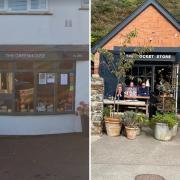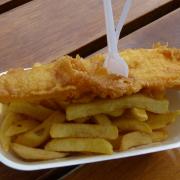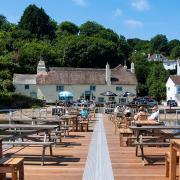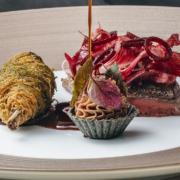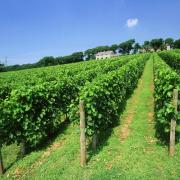James Strawbridge continues his Fowey food odyssey with a trip to a local institution: Kittows Photos by Charlotte Strawbridge

Setting up my own food business has meant that over the last few years I have had to travel back to the roots to find the very best suppliers. Instead of shopping at a supermarket I prefer to meet the people who produce ingredients at an artisan level and can feed my passion for top-quality Cornish food. We are spoilt for choice in Cornwall with some great local butchers but it is harder to find some more traditional families who still actually farm the land and run their own butchery. The Kittows are a local institution and I am happy to call them friends.

I visited James Kittow to learn more about farming and butchery in Cornwall. It’s important to say before I get stuck in that the interview was photographed in Movember (a men’s charity and awareness raising month) hence James’ fairly striking facial hair!
Life on the farm
James Kittow grew up with a proper understanding of where food comes from. In fact, from the sounds of it, his whole family has been involved at some stage in the cycle of farming, slaughter and then butchery on some level. I wanted to ask him what that was like as I have my own early memories of rearing goats and then one day they went away: my sister Charlotte believed for many years that they went to live on an organic farm when the reality was they were slaughtered, butchered and sent to a Balti house in Birmingham. I asked James what it was like growing up and did he ever have any doubts - the answer surprised me!
Confessions of a butcher...
One of his early memories was with his older sister and younger brother on school holidays and there were three goats waiting to be killed. He says: ‘Dad turned up to sort the goats out and they weren’t there.
‘Me, my brother and my sister had made little collars for them with some bailers-twine, and took them out for a walk because we didn’t want them to be killed. Of course there was hell-up when we came back. We were told off and upset anyway because they were still to be killed.’
That said, it’s fair to to say now James has got over that now. Another slight wobble on the road to continuing the Kittow’s butchery legacy was while at secondary school - James wouldn’t eat a pork chop unless the bone was removed. Part of my fascination with this is that I want to bring up my children to know where their food comes from and it is the same for James, who says he is now going through that stage with his own young children.
There’s a saying within TV: ‘Never work with animals and children’ and James completely agrees. ‘That combination is disastrous,’ he tells me. ‘They know full well how the cycle works.
‘We’ve got cattle going off tomorrow and the kids will be at school - but they’d help out if they were home.
Farming
When I asked him what is his job James responded ‘My job .... good question.’ Then he explained that he is ‘proprietor of Kittow’s Butchers and manages the factory’ employing half a dozen people as well as farming the land himself. Dealing with the cattle is James Kittow’s favourite part of his business and he seems more relaxed when we chat outside the factory. He also admits that in his opinion ‘John Deere - is up there with Armani’ - I’m not going to argue with that!
One of the reasons that I decided to visit James was that he rears the closest thing to a Cornish breed. North Devon Ruby Red cattle are a breed that thrives in my county and is becoming increasingly popular. They are some of the largest old fashioned breeds and are perfect for beef - potentially too large for most smallholdings but a fine animal and fairly docile given the large size. There is no specific breed of cattle that originates from Cornwall so the rust coloured North Devon have been partially adopted as a local breed. As well as a decent herd of Red Devons James also has a few of the smallholder’s favourite Dexters.
Butchery
James tells me that he has ‘always been involved in the meat business - ever since I can remember.’ They built the current factory in 2003 and the personal and professional approach to business is helping them to expand. In the butchery I spoke to Richard - a new member of the team who has been in the meat trade all his life with 30 years working in Cornwall. Compared to the experience in a big factory Richard reveals that it is a ‘completely different concept - dealing with an individual customer rather than in a factory with multiple customers on a large scale’. He explains that it is ‘much more personal compared to a factory’ and enjoys working ‘one to one’. This is a trend that is a slight backlash against larger factory butchers and Kittows have ‘diversified over the years.’ He believes that one motivation for this change of direction is that ‘they’ve developed because people want different cuts now.’
Baking & Deli
Whilst at the butchery I also spoke to Jane Olds in the bakery section. She produces a range of products; cakes, cutting pies, sausage rolls, quiches, ‘award-winning’ picnic pies (that recently picked up the first of many prizes - a Bronze at the Taste of the West awards) The most Cornish product they make on site is their delicious ‘Hogs Pudding Bakes’ - small baking dish with their own hogs pudding, Dauphinoise potatoes, peppers, and cheese sprinkled on top’. These are available as a ‘family size one or individual to then bake at home’. Jane explains that the major advantage to ‘in house here’ is that when she ‘wants something, I’ll have it now’ - plus James tells me there’s ‘no phone bill’! The Kittows mainly provide their artisan products for their family butchery and deli in Fowey but also supply other pubs and ‘kitchens that might not have the time to do the fancy side of it’.




